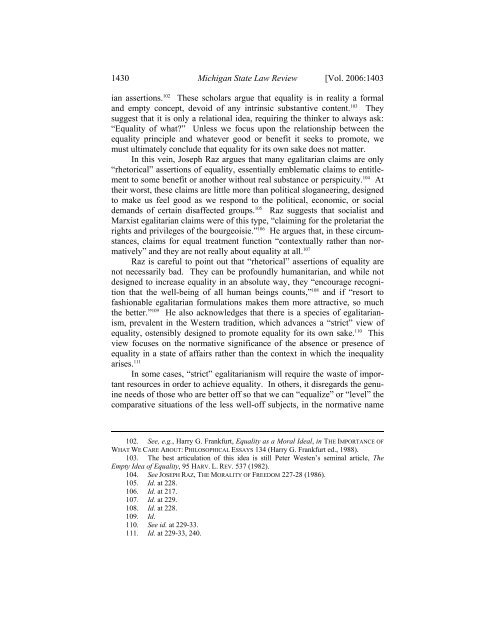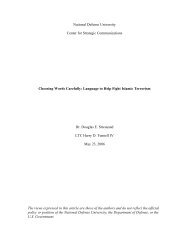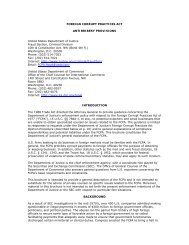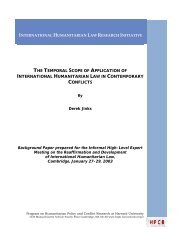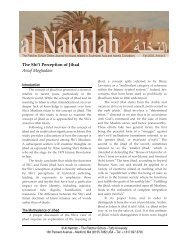1430 Michigan State Law Review [Vol. 2006:1403ian asserti<strong>on</strong>s. 102 These scholars argue that equality is in reality a formaland empty c<strong>on</strong>cept, devoid of any intrinsic substantive c<strong>on</strong>tent. 103 Theysuggest that it is <strong>on</strong>ly a relati<strong>on</strong>al idea, requiring the thinker to always ask:“Equality of what?” Unless we focus up<strong>on</strong> the relati<strong>on</strong>ship between theequality principle and whatever good or benefit it seeks to promote, wemust ultimately c<strong>on</strong>clude that equality for its own sake does not matter.In this vein, Joseph Raz argues that many egalitarian claims are <strong>on</strong>ly“rhetorical” asserti<strong>on</strong>s of equality, essentially emblematic claims to entitlementto <str<strong>on</strong>g>some</str<strong>on</strong>g> benefit or another without real substance or perspicuity. 104 Attheir worst, these claims are little more than political sloganeering, designedto make us feel good as we resp<strong>on</strong>d to the political, ec<strong>on</strong>omic, or socialdemands of certain disaffected groups. 105 Raz suggests that socialist andMarxist egalitarian claims were of this type, “claiming for the proletariat therights and privileges of the bourgeoisie.” 106 He argues that, in these circumstances,claims for equal treatment functi<strong>on</strong> “c<strong>on</strong>textually rather than normatively”and they are not really about equality at all. 107Raz is careful to point out that “rhetorical” asserti<strong>on</strong>s of equality arenot necessarily bad. They can be profoundly humanitarian, and while notdesigned to increase equality in an absolute way, they “encourage recogniti<strong>on</strong>that the well-being of all human beings counts,” 108 and if “resort tofashi<strong>on</strong>able egalitarian formulati<strong>on</strong>s makes them more attractive, so muchthe better.” 109 He also acknowledges that there is a species of egalitarianism,prevalent in the Western traditi<strong>on</strong>, which advances a “strict” view ofequality, ostensibly designed to promote equality for its own sake. 110 Thisview focuses <strong>on</strong> the normative significance of the absence or presence ofequality in a state of affairs rather than the c<strong>on</strong>text in which the inequalityarises. 111In <str<strong>on</strong>g>some</str<strong>on</strong>g> cases, “strict” egalitarianism will require the waste of importantresources in order to achieve equality. In others, it disregards the genuineneeds of those who are better off so that we can “equalize” or “level” thecomparative situati<strong>on</strong>s of the less well-off subjects, in the normative name102. See, e.g., Harry G. Frankfurt, Equality as a Moral Ideal, in THE IMPORTANCE OFWHAT WE CARE ABOUT: PHILOSOPHICAL ESSAYS 134 (Harry G. Frankfurt ed., 1988).103. The best articulati<strong>on</strong> of this idea is still Peter Westen’s seminal article, TheEmpty Idea of Equality, 95 HARV. L. REV. 537 (1982).104. See JOSEPH RAZ, THE MORALITY OF FREEDOM 227-28 (1986).105. Id. at 228.106. Id. at 217.107. Id. at 229.108. Id. at 228.109. Id.110. See id. at 229-33.111. Id. at 229-33, 240.
Special] Post-Enlightenment Qur’anic Hermeneutics 1431of equality. 112 It c<strong>on</strong>siders inequality as an “independent evil” with no intrinsicrelati<strong>on</strong>ship to the value, right, good, or benefit that we seek to regulate.113 Raz ultimately rejects this “strict” view of equality as well, findingthat it also is empty and formal because it is based <strong>on</strong> the false presuppositi<strong>on</strong>that equality matters even when the good being distributed does notmatter to any<strong>on</strong>e. 114 In Raz’s view, the “hunger of the hungry, the need ofthe needy, [and] the suffering of the ill,” is what matters, and not our formalc<strong>on</strong>cern for equality. 115Islamic egalitarian claims, strident as they are, may be vulnerable tothese same critiques. 116 If this is so, Islamic law scholars—particularly the“insiders,” to use H.L.A. Hart’s phrase—are living in a fool’s paradise ofself-delusi<strong>on</strong> when it comes to modern efforts to establish juridical and socialequality in Muslim societies <strong>on</strong> the basis of Islamic egalitarian norms.They have become intoxicated with the heady rhetoric of Islamic egalitarianismeven though they have not carefully examined the theoretical basis,history, and c<strong>on</strong>tent of their egalitarian traditi<strong>on</strong>. 117These shortcomings deeply disturb Muslims and others sympathetic tothe Islamic project. The shortcomings suggest that the Islamic c<strong>on</strong>cepti<strong>on</strong>sof equality are not truly universal and may not be very useful to Muslimsseeking to establish egalitarian political and social orders in the modernworld. This leads to the further intimati<strong>on</strong> that Islamic egalitarianism isnothing more than a rhetorical device in the hands of the prop<strong>on</strong>ents of thereligi<strong>on</strong>. It is useful for political propaganda and religious proselytizing but112. Id. at 231-33.113. Id. at 240.114. Raz argues that equality would not matter if, for example, all we were distributingwere “grains of sand.” Id. at 235.115. Id. at 240.116. Another line of criticism of modern egalitarian theories may also be relevant tothis discussi<strong>on</strong>. This line of criticism, led most forcefully by the writing of the ec<strong>on</strong>omistAmartya Sen, rejects the emptiness thesis but it ultimately agrees that it is a mistake to focus<strong>on</strong> the asserti<strong>on</strong> of equality for its own sake. Instead, the egalitarian theorist should be c<strong>on</strong>cernedwith the relati<strong>on</strong>ship between equality and differences in human beings. She mustpay close attenti<strong>on</strong> to human diversity and craft her theory of equality with that characteristicuppermost in her mind. In this view, the c<strong>on</strong>cept of equality has intrinsic substantive valuebut, it is a value that dynamically promotes the functi<strong>on</strong>ings, capacities, and achievements ofhuman beings rather than their static and unchanging physical, material, and social circumstances.SEN, supra note 100, at 23-26. These thinkers persuasively suggest that noti<strong>on</strong>s ofbasic equality, particularly formalistic claims of equality based up<strong>on</strong> the recogniti<strong>on</strong> of corehuman characteristics, are of little use in developing meaningful and effective political, ec<strong>on</strong>omic,and juridical systems in today’s world. This line of thinking also has much to c<strong>on</strong>tributein any meaningful examinati<strong>on</strong> of Islamic c<strong>on</strong>cepti<strong>on</strong>s of equality.117. See, e.g., HAMMUDAH ABDALATI, ISLAM IN FOCUS (1997); YUSUF DA COSTA,THE HONOR OF WOMEN IN ISLAM (2002); MAUDUDI, supra note 3; IMAM FEISAL ABDULRAUF, WHAT’S RIGHT WITH ISLAM IS WHAT’S RIGHT WITH AMERICA (2005); FARID YOUNOS,GENDER EQUALITY IN ISLAM (2002).


